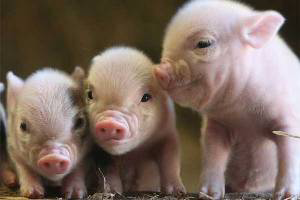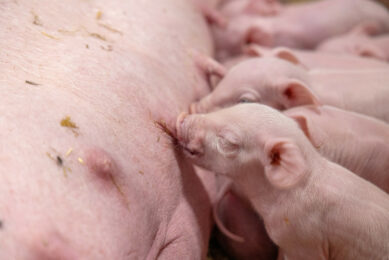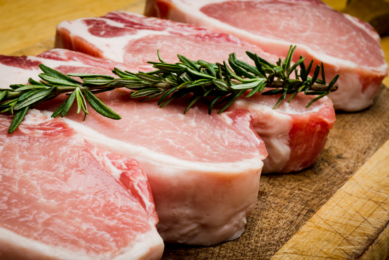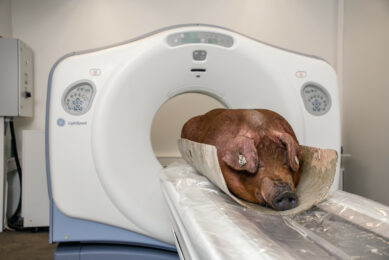Weekly weighing boosts pig growth rates

A simple weighing system has helped Gloucester pig producer Alexander and Angell Farms to revamp its feeding system and slash finishing times.
Taking inspiration from the poultry industry, where everything that moves is measured and weighed, the business decided to measure each batch of animals every time they were moved across its 380-head sow to finisher straw-based system. By measuring animals every week, the scales have helped farm staff identify flaws in their management and get a better understanding of how their decisions impact on pig performance and the farm’s profitability.
“We got the scales about five years ago with the idea that if we aren’t measuring, it’s very difficult to improve,” says farm manager Sophie Hope. The project was funded through the ongoing BPEX Innovation Fund, which helps farmers try and develop new ideas.
The system, which did not require any large capital investment, involves the pigs being weighed as they move through the farm’s three-stage production system.
Mobile weighing pads
As the pigs are moved from the nursery to the growing at eight weeks and then again to the finishing house at 12 or 13 weeks, the trailer is rested on a set of mobile weighing pads. Once the weight is recorded the animals are then unloaded. “We have to move them anyway so it is no disruption to run them over the scales and record the data,” says Ms Hope.
“The process only adds a few minutes on to moving each batch.” Pigs stay in the same group and the entire pen is weighed at once.
The collected data is then collated on a central computer where it is checked and analysed each week. The information is then set against quarterly key performance indicators so that the farm staff can analyse what is happening on the farm. “By checking the information each week, we can see if there are any obvious abnormalities that need acting on straight away,” Ms Hope says.
Modify creep feed
“Looking at it over a longer period helps us see if there’s been any improvement on long-term changes we have made. For example, we often hold trials using different sire lines and use the data to compare different genetic performance.” Weighing the animals regularly has enabled the farm to adapt its feed regime so that diets are better suited to the pigs’ needs. “It is good to have the weights at various ages to make sure we are feeding to a good growth curve,” Ms Hope says. “It’s so easy to feed to age, but requirements can be very different. The key thing is it has allowed us to modify our creep feed to ensure we are getting maximum growth. We have a weaner, grower and three finisher diets, which we can tailor and evaluate their appropriateness.”
Improved finishing times
Since the scales were installed, finishing times have improved by over a week, although it is difficult to pinpoint exactly how much weighing the pigs has contributed to that, Ms Hope says.”Because of the genetic changes we have made, it is difficult to eke out the specific differences the scales have made, but in helping us understand the stages of growth they have been invaluable. If we can see it and measure it, we can at least set targets. If you have no idea what is happening, you are feeding blind.”
From weaning to finishing, average daily gain is 750g, while bacon pigs achieve 787g. Age to slaughter at 100kg is 21.6 weeks, down from 22.5 weeks in 2010 before the scales were implemented.
Work towards the farm’s targets
“We are looking to push daily gain closer to 800g by making things more consistent, which the scales will make it easier to check,” Ms Hope says. “Because we are weighing every batch, you can look at which ones are doing well and why that might be, whether its the time of year, the parity of the mother or something else.” Being able to check the outcomes of management decisions quickly also helps drive farm staff to work towards the farm’s targets, she adds. “I make sure I share the data with the farrowing house manager and other staff. They are really keen to know weekly weights and by having quarterly KPIs it gives direction and visibility. By having clear targets and knowing how we are doing, people question how we can do better. It’s all very well me looking at the data in the office, but showing it the guys out on the farm keeps them motivated.”
‘Gathering data is invaluable’
While this weighing system may not be suited to all farms, Ms Hope says finding a way to gather data about a herd is invaluable.
“Slatted systems can use systems where the scales are in the pens and the pigs walk over them,” she says. “We are interested in that but it is difficult to get it working in straw. But the system we use has certainly been interesting and useful for us in making decisions on diet and genetics. Having this information and knowing the growth curve is beneficial to everyone.”
More information on BPEX Innovation Fund projects.
Source: Farmers Weekly











